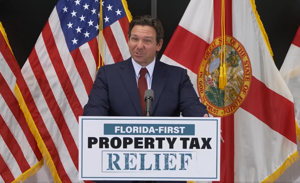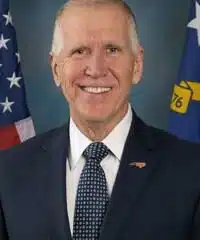(The Center Square) – House leaders have praised their early work on crafting a budget, but outside groups estimate the spending plan could add $25 trillion to the national debt over the next decade.
Part of the disconnect is the extension of the 2017 Tax Cuts and Jobs Acts, which Republicans view as preventing a tax hike rather than a reduction in revenue. Extending the provisions could considerably add to U.S. debt without corresponding spending cuts. The Congressional Budget Office has said it won’t pay for itself without further budget offsets. Another issues is President Donald Trump’s tariff plan, which could raise revenue, but figuring out how much remains a challenge as Trump implements some tariffs and leaves others on pause.
In December, Trump promised to cut “hundreds of billions” in federal spending in 2025 through the reconciliation progress. Last week, Trump posted “balanced budget” in all capital letters followed by three exclamation points on Truth Social. He signed the post with his initials. Congress hasn’t proposed anything close to meeting those goals.
The House resolution would allocate $4.5 trillion to extend the president’s 2017 tax cuts. The House resolution raises the debt ceiling by $4 trillion and instructs congressional committees to find at least $1.5 trillion in spending cuts over the next 10 years, only partially offsetting the tax cuts extension. In return, the bill would authorize a $300 billion increase in mandatory spending split among the Armed Services, Homeland Security, and Judiciary committees.
Trump’s comment aren’t the only ones that don’t square with the proposals Republicans have put forward.
U.S. Rep. Jodey Arrington, a longtime fiscal hawk, holds the House Budget Committee gavel, but it’s unclear if he’ll correct course on the nation’s spending even with Trump in the White House and narrow GOP majorities in both legislative chambers.
“This budget resolution is more than numbers on a ledger, it’s a blueprint for restoring America’s security, prosperity, and leadership in the world,” Arrington said. “It’s a promissory note for our children to preserve the land of liberty and opportunity by safeguarding it from an unwieldy government and the unbridled spending, taxing, and regulating that threatens to destroy it. This budget blueprint is the fiscal framework for our unified Republican leadership to rein in Washington’s reckless spending and endless bureaucracy, reignite economic growth and prosperity, and restore the bulwark of our common defense.”
However, the blueprint he’s talking about doesn’t stop the federal government from spending money it doesn’t have. An analysis from the Committee for a Responsible Federal Budget said the budget resolution includes $3.3 trillion of net allowable deficit increases. With interest, that would allow almost $4 trillion of additional debt. A bill consistent with those instructions would increase debt in 2034 to 126% of gross domestic product, a measure of economic output. The budget window – fiscal year 2025 through fiscal year 2034 – is an eight-year extension of the 2017 Tax Cuts and Jobs Act, which could make the $4.8 trillion of tax cuts and spending increases in this budget window translate to $5.5-$6 trillion of 10-year increases, CRFB noted.
“Overall, the budget resolution would allow lawmakers to increase borrowing by nearly $4 trillion over the next decade at a time when it would be a mistake to make our fiscal situation worse,” the nonpartisan group said.
Michael A. Peterson, CEO of the Peter G. Peterson Foundation, said the House budget plan could add $25 trillion in debt over the next decade.
“Unfortunately, this resolution sets the stage for adding trillions more in new deficits and debt,” he said. “It allows for $4.5 trillion in revenue reductions, with only $1.2 trillion in offsets. All told, this plan would add more than $25 trillion to the debt over the next decade.”
Peterson said taxpayers can’t afford it and lawmakers should make changes.
“They should avoid budget gimmicks like unrealistic economic growth, undefined spending cuts, uncertain tariff revenue, or timing games, all of which simply conceal more debt,” he said. “The bottom line is that America is in terrible fiscal shape and the new administration and Congress have many available policy options to improve our fiscal outlook, or at the very least fully offset any policies they wish to enact or extend. Now is the time to prioritize our fiscal future and put our nation on a more sustainable path.”
Congress’ own research service, the Government Accountability Office, has for years been warning presidents and lawmakers that the nation remains on an unsustainable fiscal path. The GAO repeated those warnings last week.
A GAO report warned that unchecked spending could push public debt to 219% of GDP by 2051 and create a significant economic and national security risk.
“We project that public debt will reach an unprecedented level by 2027,” said Gene Dodaro, U.S. Comptroller General and head of the GAO. “We’re calling on Congress and the Administration to act now to develop and implement a strategy to address this acute challenge. Inaction could result in great difficulties for many Americans and impede policymakers’ flexibility to respond to future economic recessions or unexpected events.”
Republican Study Committee Chairman August Pfluger, R-Texas, said the group will continue to look for ways to reduce the deficit.
“I commend Budget Chairman Jodey Arrington on navigating a budget resolution through markup and setting up the Trump agenda for success,” he said. “RSC’s stated position is this process must reduce the budget deficit and we will continue to work with the Administration and designated committees to achieve additional savings.”


















































